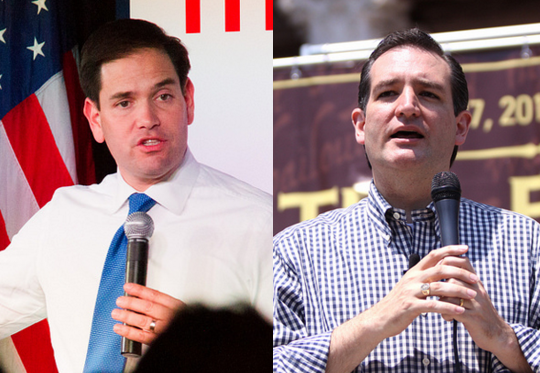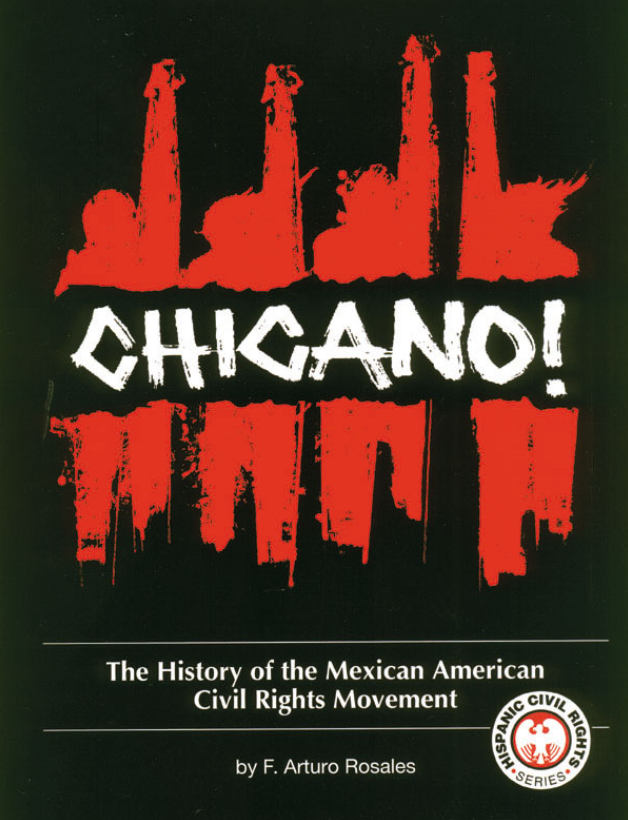Cruz and Rubio: Chicanos never dreamed that Latino political ascendency would be like this – or them

As Republicans move closer to nominating a presidential candidate, Sens. Ted Cruz of Texas and Marco Rubio of Florida have played prominent roles in the unfolding and sometimes chaotic process. Though the fortunes of both are very much in doubt, their candidacies have definitely had an impact on the long cherished Chicano dreams of attaining political power and respect. Back in the ‘60s heyday of the movement, who would have dreamed that the first Latinos to have a serious shot a major party’s presidential nomination would be archconservative Cuban Republicans?
By Arnold Garcia, NewsTaco
Watching Ted Cruz roll the perceived invulnerability of Donald J. Trump into a ball and bounce it off of Iowa caucus site walls last month triggered memories of conversations with Chicano activists back in the movement days of the late 1960s.
The world was much simpler then and so were the dreams. They dreamed of attaining educational equity and respect, both economic and political. They dreamed of days that Latino candidates could realistically expect to win every once in a while. In short, we shared a dream that we could make a difference in a different world.
Well, it’s a different world all right, but not necessarily what we had in mind in 1968. It would have been a pretty bold dreamer who could have conjured an image of a Latino being a viable presidential contender of a major U.S. political party. But in 2016, there are two of them Rafael Edward Cruz and Marco Rubio, both Republicans.
[pullquote]. . . neither are what the khaki clad and desert boot wearing activists dreamed of when conjured a Chicano utopia.[/pullquote]A dream, turned nightmare
Cruz – better known as Ted – and Rubio are a Chicano activist’s dream, all right.
A nightmare that is.
In the first place, they are of Cuban, not Mexican, descent and while some of their culturally conservative ideas might dovetail with your Tia Lupe’s, neither are what the khaki clad and desert boot wearing activists dreamed of when conjured a Chicano utopia.Though Rubio is struggling for his political life, he is considered by the pundits to be the last gasp hope of a Republican establishment to stop Donald J. Trump’s determined march to capture the GOP presidential nomination. Cruz is trying to posture himself as the best Trump alternative, but has yet to seal the deal. Whatever their chances, neither Cruz nor Rubio will go quietly into that good night.
Regardless of what happens from here on in, Cruz has already made history by racking up the most votes ever in an Iowa Republican primary.
And let’s not overlook the history Cruz made when, despite his obviously Latino surname, he knocked off David Dewhurst, a millionaire and Texas lieutenant governor in 2012 race for the GOP Senate nomination.
[pullquote]. . . both these candidacies are going to have an impact on how Mexican-Americans maneuver politics in the future. [/pullquote]I can hear teeth grinding, but like it or not, both these candidacies are going to have an impact on how Mexican-Americans maneuver politics in the future. They are going to redefine what it means to be a Latino candidate.
Though we love to argue about who is “Latino enough” or “Chicano enough” the conversation is a ‘60s indulgence that is increasingly irrelevant.
The romantic notion of Chicano unity is just that – a romantic notion. [tweet_dis]It would be impossible to unite Mexican-Americans in the Southwest around a single political, social or economic issue.[/tweet_dis] That’s because Latinos are a diverse group, economically and politically with widely divergent notions on issues from the national defense to immigration.
Before, Latino candidacies were as stereotypical as an episode of the “Cisco Kid”. We want bilingual education and immigration reform and not much else. Immigration reform and bilingual education are noble causes, but Latino communities want more. They still long for educational parity which we hope will bring economic parity.
A long road ahead
While we can point to episodic and isolated successes, we’ve got a long way to go. According to figures compiled in 2013 by the Pew Research Center, “[tweet_dis]The income gap between whites and Hispanics has widened since 1970, when Hispanic median household income was 68% that of whites. [/tweet_dis] In 2011, Hispanic income was 60% of white income, a gap that has not changed since 2007.”
[pullquote]Like it or not, Cruz and Rubio are going to redefine Latino candidacies.[/pullquote] [tweet_dis]Like it or not, Cruz and Rubio are going to redefine Latino candidacies.[/tweet_dis] Agree with them or not, Cruz and Rubio appealed to the mostly white, older voters who dominate Republican primaries. You can say Cruz did it by pandering to their fears – a trick that Trump has mastered — and that would be a fair assessment.But that’s what candidates do. They tap into your fears long before they tap into your dreams. I can still hear teeth grinding, but fretting about it doesn’t change cold reality. Cruz and Rubio are the ultimate paradox: Latinos as important players in a party viewed suspiciously by 84 percent of Hispanic voters polled by Latino Decisions in November of 2015.
Though the odds appear to be against Cruz and Rubio right now, their candidacies are wake-up call. That dream of Latino political ascendency? It’s here.
And the manifestation of that dream should remind Chicano activists of the wisdom of that ancient caution of being careful what you wish for.
Retired journalist Arnold García was born in San Angelo, Texas and covered the Chicano civil rights movement in Texas in the late 1960s. He has mentored a rising generation of Mexican-American reporters and editors across the United States. He retired in 2013 from the Austin American-Statesman after 39 years with the newspaper, 22 of those as editorial page editor. He has served on a Pulitzer Prize jury for editorial writing and chaired a Pulitzer jury on editorial cartooning.
[Photo by NewsTaco, courtesy of Max Goldberg, Gage Skidmore/Flickr]Suggested reading


